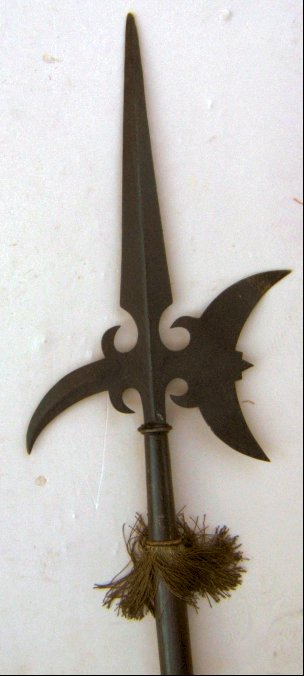Then the more I thought about it, I realized its definitions made it an unusual word too. Because it can mean some oddball thing that happens out of the blue, but it also means a fish or something too I think, and it's also a type of worm. That's a lot of different kinds of things for one word. How come there are so many definitions? And are any of them related?
- My standard word origin sources, the OED and the Online Etymology Dictionary, disagree about the order in which these definitions occurred. Other dictionaries offer still other orders and relationships among the meanings. But they agree on a lot of major elements, and since the OED is so freakin' exhaustive about everything, I'm going to regard that one as the most reliable. But just know that other people disagree with this exact order and relationship among definitions.
- In this meaning, "fluke" comes from a bunch of Old English words like flook and flowk. All these are related to the Germanic word flaut, meaning flat.
- So, the OED says, the first definition of fluke is a flat fish, a.k.a. the common flounder.

This woman is holding a fluke that she caught. Note the shape of the fish as well as the fact that it's pretty flat compared to most other fish.
(Photo from Geared Up Publications)
- The fluke fish, or flounder, is not at all uncommon. But there is an unusual thing about them: because they lie flat on the ocean floor, one eye of the flounder will migrate as the fish matures to the side of the fish that faces up.
- Another definition that the OED puts under that same set of flook/flaut/flat words is the fluke worm.
- There are actually a lot of different kinds of fluke worms, but they're all parasites and they're all equally disgusting so I'm not going to dwell on them.

This is one type of fluke worm. Others are more worm-like in shape, but this one's shape is especially similar to our friend the fluke fish.
(Photo from Shacharit Serefina)
- The OED also puts a certain kind of potato in with the fish and the worm. They are fluke potatoes, which are small and kidney-shaped.

Fluke potatoes: small, kidney-shaped, with papery skins.
(Photo from Bon Appetit, sourced from The Guardian)
- They are much better-known in the UK because that's where they hail from. You might know them as Jersey potatoes or Jersey Royal potatoes because they are grown on the island of Jersey.
- The OED thinks they're called fluke potatoes because of their shape, but I'm wondering if it may be related to our oddball definition. In 1880, a Jersey island farmer bought a potato that had a shape he hadn't seen before. He cut it up, planted the pieces in his garden, and lo and behold, he got a bunch of potatoes that tasted better than the other kind he'd been growing. So did he call them "fluke potatoes" because of their shape, or because he thought it was a fluke that they turned out so well?
II. The next set of words, says the OED, are all named flukes because they look like the fluke fish.
- The first of these meanings is the large triangular plates on each end of the business part of an anchor.

Here's an old-school type of anchor. The flukes are the flared-out ends where the anchor would bite into the sea floor.
(Photo from the Anchor Bag)

This is a newer type of anchor, called the Danforth Standard Fluke. Here, the flukes are the very large triangular plates that stick up from the horizontal crossbar.
(Photo and anchor available from iboats.com)
- The next fluke-shaped thing on the OED's list is the barb on the end of a lance, spear, or arrow.
- I would assume that means the point where the lance, spear, etc. pierces somebody. But on a couple of websites that deal in antique armory, they refer to "flukes" as the decorative flanges that flare out sideways away from the point of the lance, spear, etc.

Ambrose Antiques refers to the downward-curving flare off the front and the crescent-shaped flare off the back as the flukes. This is a copy of a 16th century Halberd from Germany, by the way.
(Photo from Ambrose Antiques)
- Also in this group is the whale's fluke, or the two flaring parts of the tail.

This particular fluke belongs to a baby blue whale swimming off the coast of Costa Rica.
(Photo from Nature's Crusaders)
- According to the OED, "fluke" can refer to both parts of the tail taken together as a whole, or it is also acceptable to refer to them as "flukes." So if you're going to say "fluke," you'd probably better make it clear whether you mean one half of the tail or the pair of flukes taken together.
- There are also several other fluke-type words that have to do with catching whales by the tail. There is the fluke-chain or the fluke-rope, both of which are looped around the flukes. One may also go fluking, which means to go whaling and to catch whales by use of fluke-chains or fluke-ropes. Or that's what they did in Moby Dick's time anyway.
III. Now we get to the "oddball" definition.
- This definition probably comes from English billiards, some time in the 1870s or so. If somebody made a lucky shot, it was called a fluke. Not only is it lucky, it's probably not repeatable and so therefore, it's unusual. (Pool players in the US today would call this slop.)
- This word could also mean a lucky guess, a chance breeze that blows somebody a good turn.
- What's kind of cool about this is that everybody is guessing that the lucky pool shot is the origin of this meaning. None of the dictionaries I consulted knows for sure that this is where it came from, and they're all making the same pool-shooting guess. Nobody offers any suggestions for root words. Nobody knows whether this meaning has anything to do with the shape of the fluke fish, or the pointy thing on the end of an anchor, or the flukes of a whale, or any of that. In fact, it may not have anything to do with the other definitions of "fluke" at all.
- So this meaning is, in effect, a fluke itself. It's a guess and it's not like any of the others in the group.
This video is labeled a fluke shot, but really, this kid is showing a tremendous amount of skill in managing the spin and placement of the ball. The shot is challenging enough, though, that maybe he'd have trouble making it happen very often. Also, the cue ball is not involved, so he couldn't really use this shot in an actual game. But still, nice touch, dude.
Sources
The OED
Online Etymology Dictionary, fluke
Dictionary.com, fluke
sensagent dictionary, fluke
New Jersey Fishing, Fluke
Great British Bites: Jersey Royal Potatoes, The Times Online, April 15, 2008
No comments:
Post a Comment
If you're a spammer, there's no point posting a comment. It will automatically get filtered out or deleted. Comments from real people, however, are always very welcome!